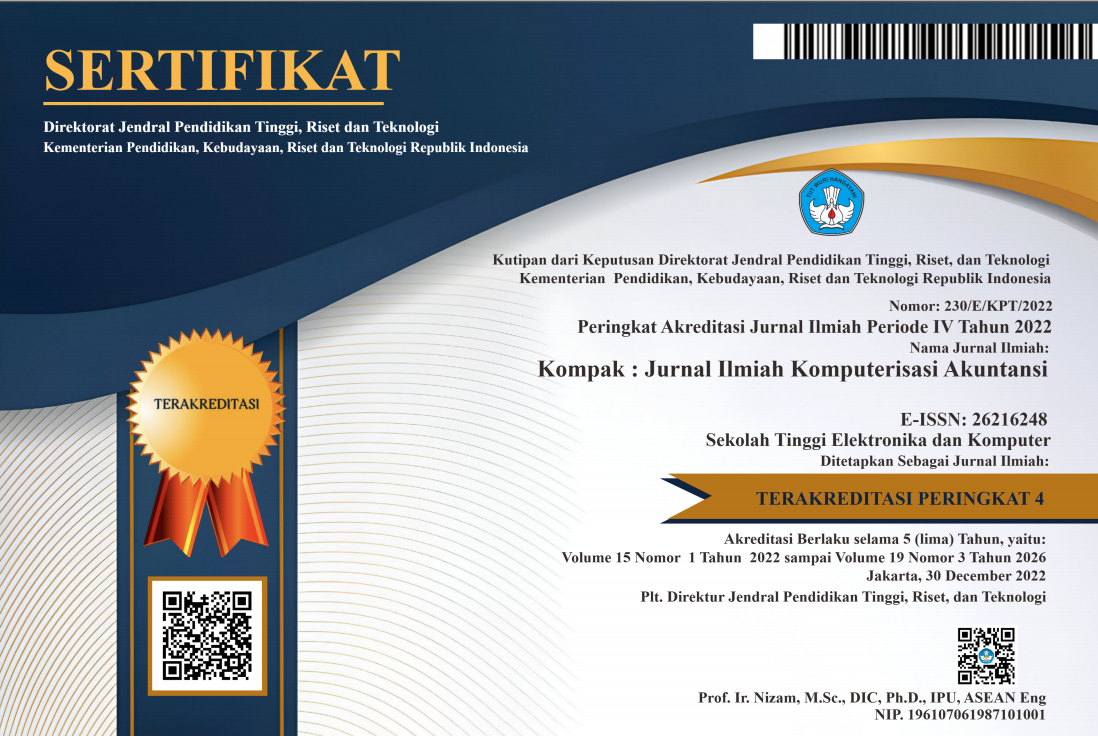Peran Keberagaman Gender Didalam Memoderasi Kinerja Environment Social, Dan Governance Terhadap Resiko Keuangan
DOI:
https://doi.org/10.51903/kompak.v17i2.2151Keywords:
Gender Diversity, Social Environment Performance, and Governance, Financial RiskAbstract
This study aims to determine the role of gender diversity in moderating the performance of the social environment, and governance on financial risk. This research approach is quantitative by using secondary data. ESG data and financial risks will be obtained from the annual reports of companies listed on the Indonesia Stock Exchange (IDX) during a certain period, for example 2018–2023. This study uses a moderated regression analysis (MRA) approach to examine the influence of gender diversity moderation on the relationship between ESG performance. This study reveals that gender diversity has a significant moderating influence on the relationship between Environmental, Social, and Governance (ESG) performance and corporate financial risk.
References
Alsayegh, M. F., Abdul Rahman, R., & Homayoun, S. (2020). Corporate economic, environmental, and social sustainability performance transformation through ESG disclosure. Sustainability, 12(9), 3910.
Bear, S., Rahman, N., & Post, C. (2010). The impact of board diversity and gender composition on corporate social responsibility and firm reputation. Journal of Business Ethics, 97(2), 207-221.
Birindelli, G., Dell'Atti, S., Iannuzzi, A. P., & Savioli, M. (2020). Composition and Gender Diversity in Board Committees: Impact on ESG Disclosure. Corporate Social Responsibility and Environmental Management, 27(3), 1488–1500.
Bloomberg. (2023). Gender Diversity and its Impact on ESG Performance: An Analysis of Global Firms.
Bolton, P., & Kacperczyk, M. (2020). Do investors care about carbon risk? Journal of Financial Economics, 142(2), 517-549.
Boulhaga, M., Bouri, A., Elamer, A. A., & Ibrahim, B. A. (2023). Environmental, social and governance ratings and firm performance: The moderating role of internal control quality. Corporate Social Responsibility and Environmental Management, 30(1), 134-145.
Catalyst. (2021). The Bottom Line: Connecting Corporate Performance and Gender Diversity.
Catalyst. (2020). The Bottom Line: Corporate Performance and Women’s Representation on Boards.
Clark, G. L., Feiner, A., & Viehs, M. (2019). From the Stockholder to the Stakeholder: How Sustainability Can Drive Financial Outperformance. University of Oxford.
Clarkson, M. E. (1995). A Stakeholder Framework for Analyzing and Evaluating Corporate Social Performance. Academy of Management Review, 20(1), 92–117.
Donaldson, T., & Preston, L. E. (1995). The Stakeholder Theory of the Corporation: Concepts, Evidence, and Implications. Academy of Management Review, 20(1), 65-91.
Eagly, A. H., & Johnson, B. T. (1990). Gender and leadership style: A meta-analysis. Psychological Bulletin, 108(2), 233-256. doi:10.1037/0033-2909.108.2.233
Fernandez-Temprano, M., & García-Sánchez, I. M. (2019). The relationship between board gender diversity and corporate social responsibility performance: Evidence from Spain. Corporate Social Responsibility and Environmental Management, 25(3), 547-558.
Freeman, R. E. (1984). Strategic Management: A Stakeholder Approach. Boston: Pitman
Friede, G., Busch, T., & Bassen, A. (2019). ESG and financial performance: Aggregated evidence from more than 2000 empirical studies. Journal of Sustainable Finance & Investment, 5(4), 210-233.
Galbreath, J. (2020). Do Boards of Directors Influence Corporate Sustainability Disclosure?. Business Strategy and the Environment, 29(1), 72–85.
García‐Martín, C. J., & Herrero, B. (2020). Do Board Characteristics Affect Environmental Performance? A Study of EU Firms. Corporate Social Responsibility and Environmental Management, 27(1), 74–94.
Giese, G., Lee, L.-E., Melas, D., Nagy, Z., & Nishikawa, L. (2020). Foundations of ESG investing: How ESG affects equity valuation, risk, and performance. Journal of Portfolio Management, 45(5), 69-83
Harrison, J. S., & Freeman, R. E. (1999). Stakeholders, Social Responsibility, and Performance: Empirical Evidence and Theoretical Perspectives. Academy of Management Journal, 42(5), 479–485.
Harrison, J., & O'Neill, H. (2019). Gender diversity and corporate governance: A review of the literature. Journal of Business Ethics, 125(3), 467-481.
Ho, V. T. (2021). Gender Diversity and Corporate Governance: A Review of the Literature. Corporate Governance: An International Review, 29(5), 587-605.
International Labour Organization (ILO). (2022). The Impact of Gender Diversity in the Workplace on Business Outcomes.
Jones, T. M., Harrison, J. S., & Felps, W. (2018). How Applying Instrumental Stakeholder Theory Can Provide Sustainable Competitive Advantage. Academy of Management Review, 43(3), 371–391.
McKinsey & Company. (2021). Diversity wins: How inclusion matters.
Meiden, C., & Silaban, A. (2023). Exploring the Measurement of Environmental Performance in Alignment with Environmental, Social, and Governance (ESG): A Qualitative Study Exploring the Measurement of Environmental Performance in Alignment with Environmental, Social, and Governance (ESG): A Qualitative Study. Information Sciences Letters, 12(9), 2287-2297.
Mitchell, R. K., Agle, B. R., & Wood, D. J. (1997). Toward a Theory of Stakeholder Identification and Salience: Defining the Principle of Who and What Really Counts. Academy of Management Review, 22(4), 853–886.
Mooneeapen, O., Abhayawansa, S., & Mamode Khan, N. (2022). The influence of the country governance environment on corporate environmental, social and governance (ESG) performance. Sustainability Accounting, Management and Policy Journal, 13(4), 953-985.
Nadeem, F., & Kousar, R. (2021). Gender diversity, environmental performance, and firm risk: Evidence from global firms. Corporate Governance: The International Journal of Business in Society, 21(4), 763-781.
OECD. (2022). Gender Equality in the Boardroom: Measuring the Impact of Gender Diversity on Business Performance. OECD Publishing.
Park, Y. N., Hahn, S. H., Lee, C. K., Kim, J., & Back, K. J. (2024). Developing an integrated resort’s (IR) environmental, social, and corporate governance (ESG) measurement scale. International Journal of Hospitality Management, 123, 103924.
Post, C., Rahman, N., & McQuillen, C. (2015). Women on boards and corporate social responsibility. Journal of Business Ethics, 130(3), 569-581. doi:10.1007/s10551-014-2089-3
Rajesh, R., & Rajendran, C. (2020). Relating environmental, social, and governance scores and sustainability performances of firms: An empirical analysis. Business Strategy and the Environment, 29(3), 1247-1267.
Shaikh, I. (2022). Environmental, social, and governance (ESG) practice and firm performance: an international evidence. Journal of Business Economics and Management, 23(1), 218-237.
Sharpe, W. F. (2024). Capital Asset Prices: A Theory of Market Equilibrium under Conditions of Risk. Journal of Finance.
Sustainalytics. (2023). ESG Risk Ratings: How Gender Diversity Affects ESG Scores.
Todorova, G., & Durisin, B. (2007). Absorptive Capacity: Valuing a Reconceptualization. Academy of Management Review, 32(3), 774-786.
World Economic Forum. (2023). Global Gender Gap Report 2023.















.png)



